
Buying an Existing Business?, Look Out for These Things
Buying an existing business is a complex decision that needs a thorough examination of the physical properties, financial accounts, and relationships between the company and its customers, community, and competitors.
Don’t try to perform this study on your own; instead, hire a professional (usually an accountant, lawyer, and someone familiar with the industry) to analyze and price the business, especially if you don’t have at least three years of experience owning and operating a similar enterprise.
The following are the benefits of buying an existing business:
- The business already has established relationships with both customers and suppliers
- Financing will be easier to obtain if the business has a good profit history
- Operations can begin immediately
- The current inventory can be sold to generate immediate cash flow.
The main obstacles include
- The cost may be higher than beginning from scratch because you frequently purchase “goodwill.”
- Existing faults may be disguised until after the sale
- Stocks may be obsolete due to age and some equipment may be malfunctioning.
- Another difficulty is that most enterprises are informal and may lack the majority of the required documentation, which raises the risk. You may need to invest some money to clean up the firm before purchasing it, which you can deduct from the purchase price.
This article will therefore explore various factors that should be put into consideration before buying an existing business.
Factors to Consider before buying an existing business
1. Require the seller to document and warrant every critical aspect of the business, including:
- That the financial accounts included as exhibits are true and correct
- No hidden liabilities exist (tax demands, lawsuits, or supplier payments).
- A detailed record of everything being acquired, including leases, contracts, amounts owed to suppliers, amounts owed by customers, inventory, fixtures, equipment, signs, intellectual property, computer hardware and software, and anything else that will help the firm succeed.
2. Have a certified public accountant audited the financial statements if they haven’t already been. If the seller refuses to pay the expense, you should do so to ensure that your investment is sound.
6. Involve your lawyer in the design of a purchase and sale agreement. The purchase and sales agreement specifies the agreed-upon price, what is being purchased, the acts needed by both the seller and the purchaser, and the time the agreement is binding on both sides.
7 Discover why the seller is selling the company. Understanding this will allow you to make an informed decision before committing.
8. Determine how long this business can be expected to last. Are there factors that could terminate the business, such as a road being built that destroys the business location?
9. If there is a lease or rental agreement, talk to the property owner to be sure the lease terms will remain the same. This is an excellent time to discuss renewal terms and termination possibilities.
10. Ask the owner to let you work in the business before buying. There is no better way of judging whether the business volume is satisfactory, whether you will enjoy working in that business, and whether there are any problems you need to straighten out before the sale is finalized.
11. A business is often successful due to the personality of the owner. If this is the case, you have to decide whether you can make the business as successful with your personality.
13. Investigate neighborhood businesses that are not direct competitors to learn what they have to say about the growth of business in your area, what problems they see for the future, and how they feel about the business you’re buying.
14. Have a credit check done on both the owner-seller and the business itself.
15. Check with suppliers to determine if the inventory you are buying is valued correctly.
16. If there are employees, talk to them about whether they will remain if you buy the business. Get any other information they are willing to provide.
17. Talk to some of the customers. Find out if they are satisfied with the business as it is now.
18. Determine if this business’ prices are competitive. Visit every competitor to see if there are any changes underway that might influence your business.
19. Check with government agencies like URA, Local governments, URSB, NSSF, etc.
20. Prepare a business plan. Use a professional accountant to give you an idea of how the business makes money and the future projections
21. Use a surveyor and engineer to evaluate the physical property if any and check the title deed. Also, do an inventory check of all movable items in the business.
Conclusion: Things to consider when buying an existing business.
Purchasing a business involves much research and strategy. It entails examining financial health, comprehending legal ramifications, and analyzing operational dynamics. To achieve a successful transaction, proceed with care, backed up by thorough research and competent guidance. If something doesn’t add up, don’t be scared to walk away.
